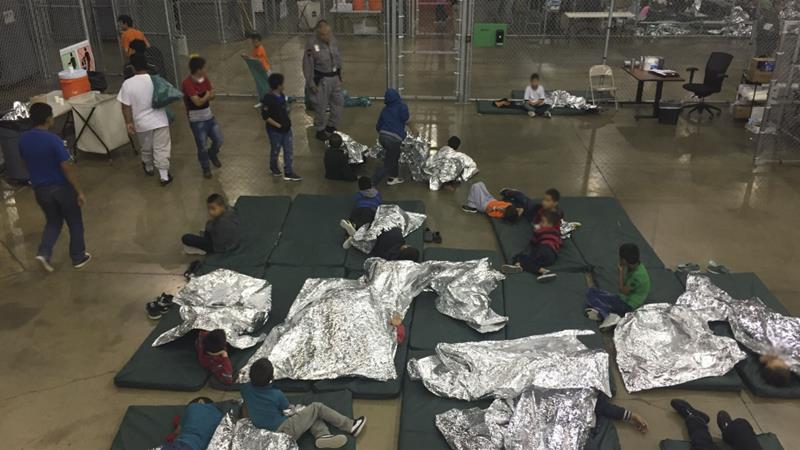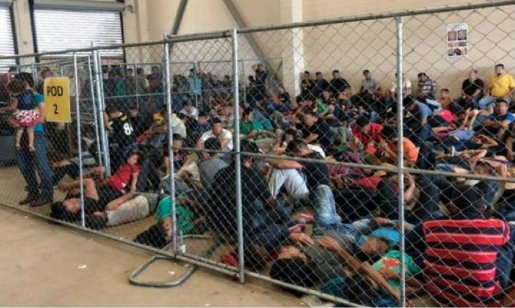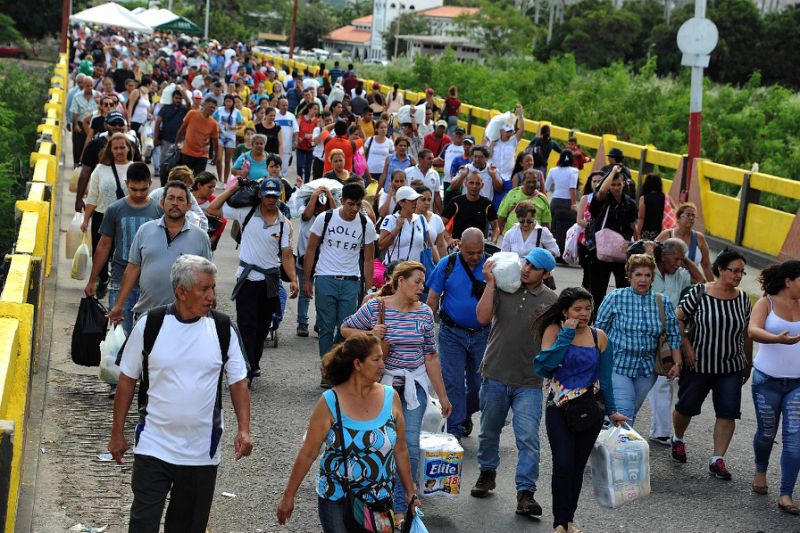On Thursday, House Judiciary Committee Chairman Jerrold Nadler sent a letter to Acting Director of Immigration and Customs Enforcement (ICE) Matthew T. Albence. Nadler’s letter addressed concerns over measures ICE is taking to protect individuals in custody from COVID-19 (coronavirus).
Currently, there are 37,888 detained individuals in ICE custody. Nadler’s letter to Albence came in the wake of reports that immigrants held in U.S. detention centers are especially vulnerable to the spread of communicable diseases — such as measles, flu and other illnesses last year.
The question still remains: Why are detained immigrants in custody so vulnerable to the spread of communicable diseases?
In March 2019, a memo was sent to top officials within the Department of Homeland Security (DHS), describing allegations that ICE has “systemically inadequate medical and mental healthcare and oversight to detainees in facilities throughout the U.S.”
This report, one of many from government agencies and media outlets, details stories of detained immigrants receiving such poor healthcare that it significantly contributed to deaths in centers across the country.
Problems of alleged inadequate healthcare and poor oversight have been attributed to an issue of private corporations operating certain detention centers across the country.
Outsourcing Healthcare to Private Companies
In 2017, a 64-year-old detained individual named Kamyar Samimi died in ICE custody in a detention center in Aurora, Colorado.
After his death, ICE released a statement explaining that his cause of death was cardiac arrest. The statement went on to explain that ICE spends $200 million annually on health care services for detained individuals in their custody.
However, before Samimi died, there were repeated lapses in his medical care while he was detained in ICE custody. While he was held in detention, he had complained previously of vomiting and pain for several weeks leading up to his death.
According to reports, Samimi explained to medical officials upon his arrival that he had been taking methadone, a drug that is known for treating opioid addiction, after a car accident that injured his back. He told a nurse he felt like he was experiencing withdrawals, but nurses told investigators that they didn’t have training in how to deal with opioid withdrawal.
Despite this, ICE’s report did not connect any medical failures to his death.
Investigations into suspicious deaths in immigrant detention centers like Samimi’s, as well as critical audits, have raised questions about the quality of medical care that detained individuals are receiving. One of the main private contractors providing healthcare in these centers across the U.S. is known as Wellpath, formerly known as Correct Care Solutions.
Wellpath is a Nashville-based firm that is one of the country’s biggest providers of private health care to prisons and immigration detention facilities.
Despite profiting from providing healthcare to detained immigrants, Wellpath has been sued 1,395 times in federal courts over the last ten years over complaints of medical negligence, malpractice and inadequate medical care.
The private prison company GEO Group runs the Adelanto ICE Processing Center, the largest immigrant detention facility in California. GEO subcontracts Wellpath to provide medical care in the Adelanto facility, where a 2018 report from DHS called the care “untimely and inadequate.”
Wellpath is also contracted to provide medical care to numerous other facilities across the U.S.
“The company’s incessant push for profits at the expense of providing necessary medical care has foreseeably led to corner-cutting, resulting in deaths and untreated injuries of countless people,” Darold Killmer, a civil rights attorney who has represented multiple plaintiffs in cases against the company, told HuffPost last year.
“We have to look at this in an economical sense,” explained Lisa Eckenwiler, an associate professor of philosophy at George Mason University. “So, there is a sector in the economy that is literally immigration prisons. This is a thing now.”
In the wake of many reports of untreated injuries, illness and death, ICE officials told AP News that they were working to ensure that all detention facilities comply with government standards.
Samimi’s family is currently working with the American Civil Liberties Union to sue GEO for the wrongful death of Samimi.
Representatives from ICE have not yet responded for comment.
Health Problems in CBP Facilities
In July of 2019, Acting Secretary of DHS Kevin McAleenan explained in a tweet that “We generally consider 4,000 detainees to be a high number of migrants in custody, and we consider 6,000 detainees to be a crisis level.”
He went on to write that, at the time, there were between 10,000 and 12,000 detained migrants in CBP custody on any given day.
CBP is responsible for enforcing the U.S. immigration policy along the border, while ICE is responsible for enforcing within the U.S.’s interior. Both agencies fall under the Department of Homeland Security (DHS).
Detention in CBP’s custody is only intended for the short-term, according to a memo released by the Deputy Inspector General of DHS Jennifer Costello.
Costello explained that CBP is solely intended for short term detention of undocumented immigrants that enter the U.S. without valid travel documents.
After initial processing by CBP, detained individuals should be transferred to different agencies within the government, such as ICE or the Department of Health and Human Services (HHS).
The supposed guideline set by the federal government for detainment time in CBP custody is 72 hours, but immigrants are being held in CBP custody for days, weeks or even months at a time.

Costello also said that both ICE and HHS are operating “at or above capacity.. Because of this, Costello wrote, “CBP has experienced increasing instances of prolonged detention in its facilities.”
Further, the administration of President Donald Trump announced in August that it will no longer follow the so-called Flores Agreement, allowing migrants, including children, to be detained indefinitely.
Pediatricians that treat migrant children in these facilities told CNN that overcrowding is one of many factors that can cause detained individuals to become ill and even die.
This year numerous reports have been released of babies drinking from unwashed bottles as well as adults and children being held for days, weeks or months in cramped areas with no access to necessities like toothpaste or soap.
There have been outbreaks of flu, lice, scabies, and chickenpox in CBP facilities in the U.S.
A spokesperson for CBP told The Globe Post that “Individuals in CBP custody should generally not be held for longer than 72 hours in either CBP hold rooms or holding facilities and every effort is made to hold detainees for the minimum amount of time required for their processing, transfer, release or repatriation as appropriate and operationally feasible.”
The spokesperson added that while 72 hours is what CBP strives to achieve, it is “not always possible based on a number of factors.”
Health Problems in ICE Facilities
ICE has also attributed report healthcare issues with overcrowding.
The agency has expanded to record numbers of detained individuals under the Trump administration. Thousands of detained immigrants in ICE’s custody have made it through the initial processing for asylum, a process that generally led to their release from ICE custody in the past.
Many of ICE’s facilities are privately owned and operated by private prison corporations such as GEO and CoreCivic.
“No child has died in ICE custody,” a spokesperson for ICE told The Globe Post via email.
However, according to a report from the American Immigration Lawyers Association (AILA), Twenty-six adult immigrants have died in ICE custody during the Trump administration.
According to a study from Freedom for Immigrants, between 2003 and 2017, more people have died at the Eloy Detention Center in Arizona and the Houston Contract Detention Facility in Texas, both of which are run by CBP, than any other detention facilities.
Additionally, a detained immigrant died in the Houston Contract Detention Facility earlier this year.
Both facilities are owned and operated by CoreCivic.
The Cibola Detention Center, New Mexico
On Jan. 30, dozens of transgender immigrant detainees were moved from the Cibola Correctional Center in rural New Mexico to other facilities across the U.S.
This facility, also owned and operated by CoreCivic, has transferred detained transgender immigrants to different facilities.
Ryan Gustin, the Public Affairs Manager for CoreCivic, said in a statement to The Globe Post that “The Cibola County Correctional Center is transitioning from a contract healthcare provider to in-house medical services. Detainees with unique medical needs were transferred from Cibola County while the facility continues to work through this transition of providers.”
Gustin added that “CoreCivic is committed to providing high-quality healthcare to those entrusted to our care.”
Previously, Cibola was the only detention center that held detained transgender immigrants.
One long term report on the conditions in Cibola was released by Amnesty International in 2018.
Denise Belle, a researcher for Amnesty International that focuses on refugee and migrant rights, explained the findings of this report.
“I have been to multiple detention centers,” Belle explained. “And where I’ve seen this specifically, working with my colleagues is at Cibola [Detention Center] In New Mexico, where they used to have … a special dedicated space for trans asylum seekers.”
“One reason they shut it down was because of inadequate healthcare, lack of access to proper drugs, and a decrease in mental health among detained individuals,” Belle explained.
Why does this continue to happen?
In April of 2019, Eckenwiler penned an Op-Ed for The Hill, stating that border facilities should be “designed to minimize and, where possible, prevent further harm to health.”
She spoke to the overall public health aspect of the issue. “Even if all you care about is yourself, there are good reasons to try to respond to people’s health concerns. Because things like infectious communicable diseases happen in settings where there are a lot of people living in really tight spaces.”
Correction: A previous version of this story incorrectly stated that the Cibola Correctional Center was shut down. The facility remains operational but has transitioned to providing in-house medical services for those detained there.
More on the Subject
Homeless Americans Particularly Vulnerable Amid COVID-19 Pandemic






















